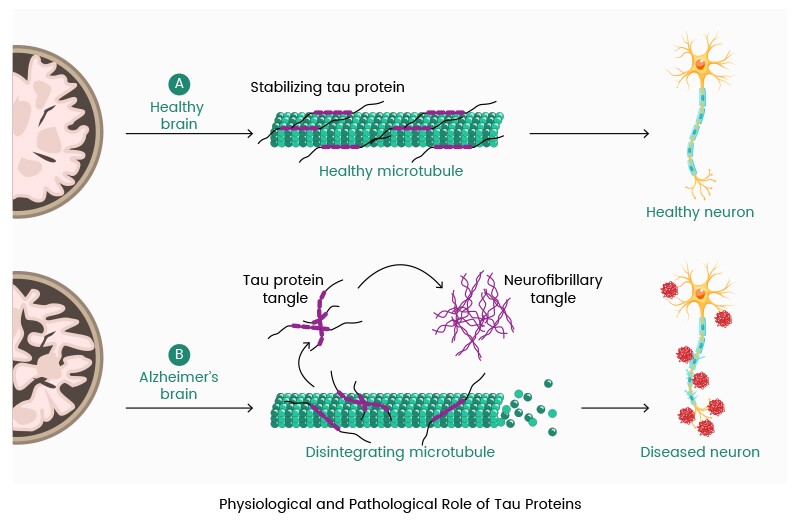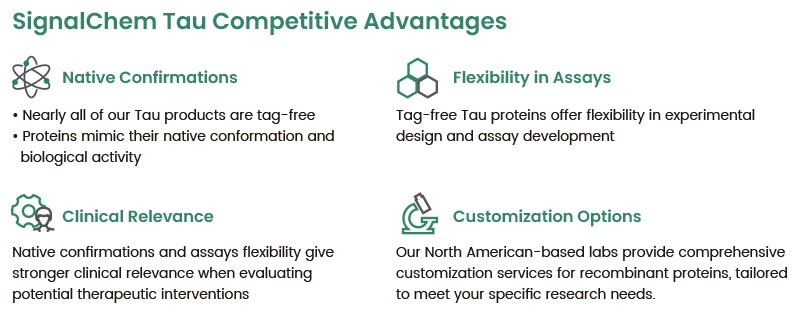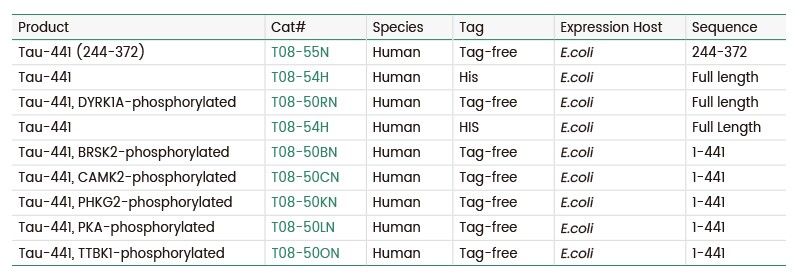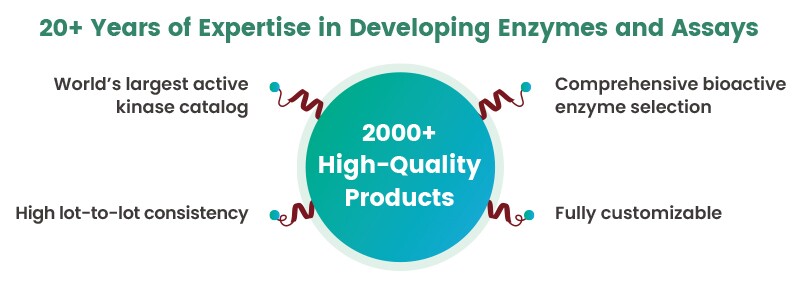SignalChem Biotech provides diverse recombinant Tau proteins for research, helping advance tau-targeted therapies that may modify disease progression in Alzheimer’s and related tauopathies.
Tau proteins normally stabilize microtubules and support neuronal function, but in neurodegenerative diseases like Alzheimer’s, they undergo abnormal modifications, leading to aggregation and formation of neurofibrillary tangles (NFTs). These tangles disrupt cellular function, contributing to neuronal death and cognitive decline. Therapeutic strategies target tau through kinase inhibition, aggregation prevention, immunotherapy, microtubule stabilizers, and gene therapy. SignalChem Biotech supports these efforts by providing diverse recombinant Tau proteins for research, helping advance tau-targeted therapies that may modify disease progression in Alzheimer’s and related tauopathies.
Understanding Tau Pathology in Neurodegeneration
Under normal conditions, tau proteins bind to microtubules, stabilizing neuronal structure and promoting cellular transport. However, in tauopathies, tau undergoes abnormal post-translational modifications, including hyperphosphorylation, acetylation, and truncation, which lead to its detachment from microtubules and aggregation within neurons. These tau aggregates form neurofibrillary tangles (NFTs), a hallmark of AD and other tauopathies. As NFTs accumulate, they compromise neuronal function, hinder axonal transport, and ultimately cause neuronal death. Importantly, the extent of tau pathology is a better predictor of cognitive impairment in AD than amyloid-beta plaques, underscoring the importance of tau as a target for therapeutic intervention.
Tau-Targeted Drug Development Strategies
Multiple strategies are being explored to counteract tau pathology, including:
- Inhibition of Tau Post-Translational Modifications
Tau hyperphosphorylation is a major driver of tau aggregation. Therapeutic approaches focus on inhibiting kinases such as GSK-3β, which phosphorylate tau. Researchers are also investigating other modifications, like acetylation and O-GlcNAcylation, that influence tau aggregation and pathology. - Inhibition of Tau Aggregation
Small molecule inhibitors that prevent tau monomers from aggregating into toxic oligomers and filaments are being developed to reduce the formation of NFTs and mitigate their damage to neurons. - Immunotherapy
Immunotherapy approaches aim to clear tau aggregates from the brain.- Active immunotherapy involves tau peptide vaccines that stimulate the immune system to produce antibodies against tau.
- Passive immunotherapy uses pre-formed antibodies targeting pathological tau, aiming to halt disease progression by eliminating tau aggregates.
- Microtubule Stabilizers
Since tau loss disrupts microtubule stability, researchers are testing stabilizers like epothilone D, which may compensate for tau dysfunction, improve neuronal resilience, and reduce tau-mediated damage. - Gene Therapy
Techniques such as antisense oligonucleotides (ASOs) are being investigated to downregulate tau expression, potentially lowering the formation of tau aggregates, and slowing disease progression.
SignalChem’s Contribution
Tau-focused approaches represent one of the most promising avenues for developing disease-modifying therapies for Alzheimer’s disease (AD) and other tauopathies. With ongoing clinical trials, researchers continue to make strides toward understanding tau pathology and translating discoveries into treatments that may alter the course of neurodegenerative diseases. SignalChem Biotech, part of Sino Biological, manufactures one of the most comprehensive selections of recombinant Tau proteins. Our selection includes Tau isoforms, phospho-Tau, and mutant variants, which demonstrates SignalChem’s drive to provide quality reagents to facilitate research in neurobiology.
More Tau Proteins
More Products and Services from SignalChem Biotech
SignalChem Biotech, part of Sino Biological, provides a comprehensive range of products and services in biotechnology and life sciences. We provide kinase drug discovery solutions spanning from target discovery to compound screening, profiling, and optimization. Our offerings include the largest selection of active kinases—covering over 90% of the human kinome—along with other key drug targets in essential signaling pathways and small molecule ligands. With years of experience, SignalChem Biotech also specializes in custom enzyme and assay development, and swift compound screening and profiling services.







